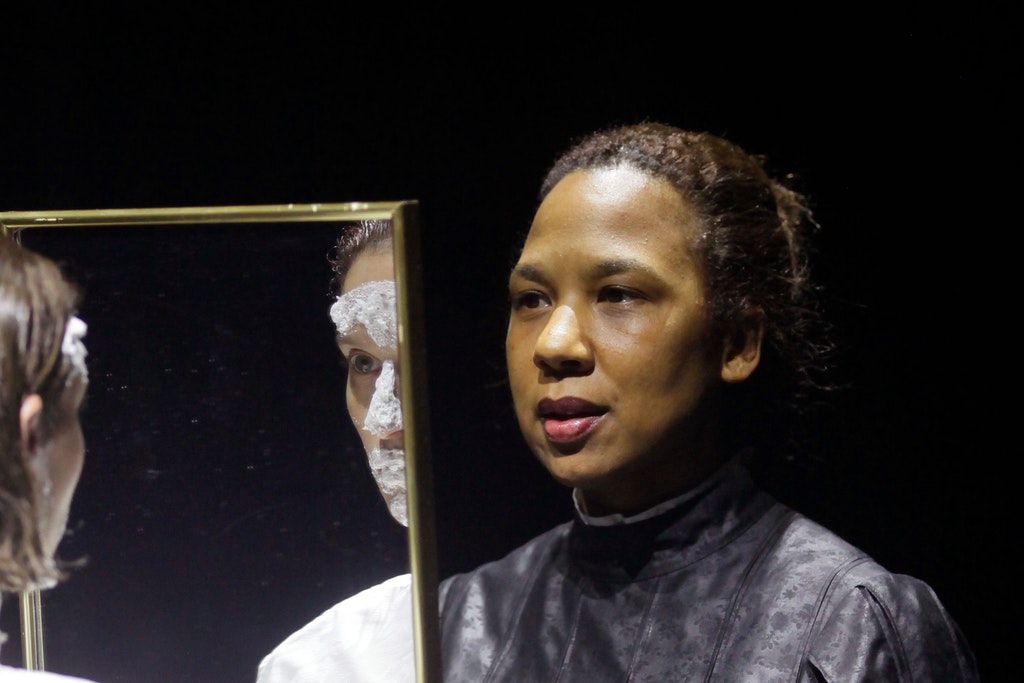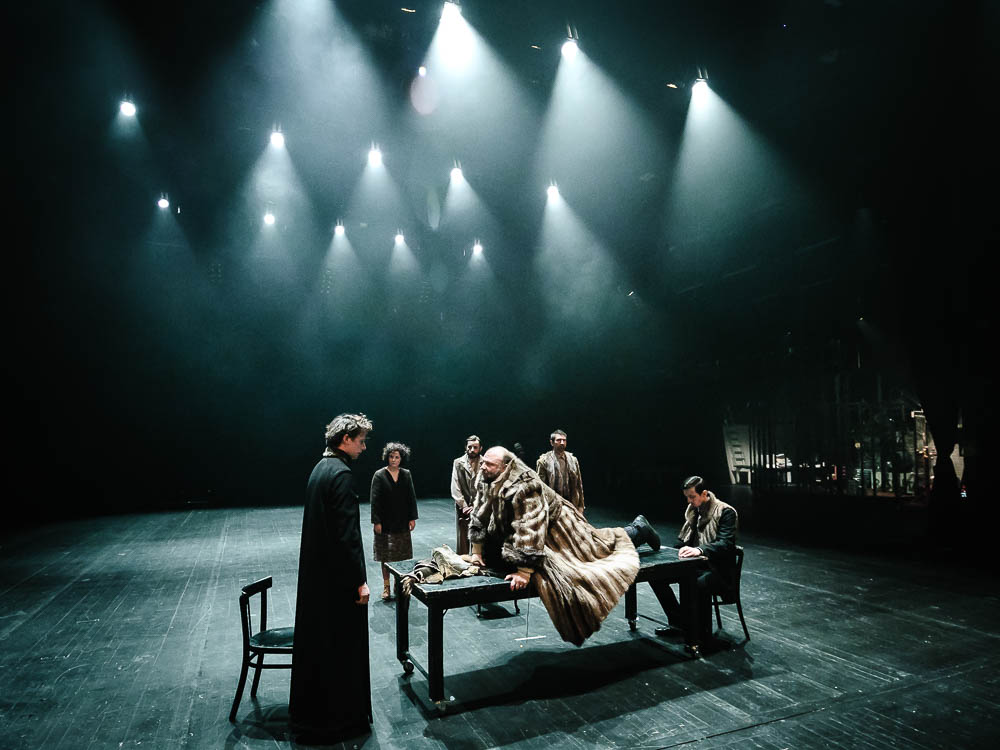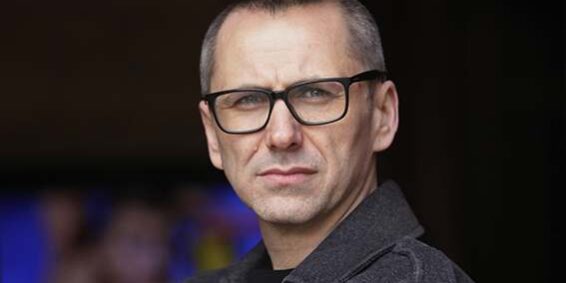Oliver Frljić’s new hybrid production, Danton’s Death / Iphigenia will open this month at the Maxim Gorki Theatre in Berlin. He talks to Tom Mustroph about theatre’s response to the war in Ukraine, the outdated concept of ‘character’, and making his return to the Croatian theatre scene.
The Maxim Gorki Theatre has become a home to Frljić. He is one of the members of the artistic board and the interview takes place on the theatre terrace, with the sun shining, but the war in Ukraine overshadows the production.
Tom Mustroph: Does it make any sense to be doing theatre now? Wouldn’t it be better to go to Ukraine and fight for freedom and democracy? Or at least prepare for performing in Kiev bomb shelters or play Iphiginia in front of Russian soldiers, who are being sacrificed now by the Kremlin, just as Iphigenia was sacrificed by Agamemnon?
Oliver Frljić: I don’t know what makes sense at this time. I’m trying to figure it out for myself. I have experience of the war in Yugoslavia and I was hoping this was the last war that I was going to experience. I remember that, in 1993, Susan Sontag was in Sarajevo staging Waiting for Godot. That was great and very cynical at the same time. As we know, at the end of the play a boy comes and says Godot won’t be coming today.
Tom Mustroph: Currently you are preparing Danton’s Death / Iphigenia for the Maxim Gorki theatre. It seems heavy stuff, to consider these two iconic texts alone, so how will you bring them together?
Oliver Frljić: The wish is to create intertextual dialogue between those two texts, to see how they mirror each other and where they semantically intersect each other. Our decision to combine so seemingly distant texts is not arbitrary. Both of them deal with the topic of sacrifice. In Danton the revolution sacrifices its children. And in Iphigenia Agamemnon is about to sacrifice his own daughter to please the gods and get the winds to go to the war. As to how those texts enter into representational interplay with reality we live right now, we’ll see.
Tom Mustroph: It’s interesting that in both of the plays there is ambiguity: Is there a sacrifice of the other or parts of the self? Because at least Danton and Robespierre are part of the revolutionary movement, and they are facing death at the tribunal. And Iphigenia is the daughter of Agamemnon, flesh from his flesh. So is it self-sacrifice or the sacrifice of others?
Oliver Frljić: Both of those sacrifices could look, in their different contexts, as political instruments. At first glance their respective endings seems to be quite distant, but are they really? Both of those sacrifices nominally take place to “save” the community. Of course, I am the most interested in what can be masked under the pretext of “saving community”. Both of those plays bring us also into proximity of war. One of those wars is a class war, the other one is Trojan.
Tom Mustroph: Coming back to Danton’s Death / Iphigenia, for this you will have an all-female cast. Why did you make this choice?
Oliver Frljić: The readings of these plays will deconstruct their patriarchal model. In both of them women are objectified. In Danton they do not have political subjectification except if one takes Lucile’s scream at the end of play: “Long live the King!” for it, which I wouldn’t do. When the author let’ them speak, like in the scene with Simon’s wife, one can see that she rationalized, not without bitter irony, the logic that turned her daughter into sexual worker. In Iphigenia, Agamemnon’s daughter is the most direct investment in the war. She becomes a commodity exchanged between her father, the gods and the other interested to reach Troy. The reduction of people to what today is termed a bare-life is there from the dawn of human conflict.
Tom Mustroph: You told me, that you would like the words of both plays to intertwingle and float, and that you want to get rid of that traditional theatre practise to identify roles and identities. Is this a new approach in your work?
Oliver Frljić: We talk so much about fluid identities, but when it comes to the theatre, it is too often only about fixing them. Instead of doing a casting based on the characters and using the plot as a means of dramaturgical development, I want the text to migrate from one actress to another, I want to dissolve this conservative idea of character as something we have to identify at the begging of the evening and follow thorough over the rest of it. The text moves from one actress to another raising the question of to whom certain voices belongs. In the play we perform as well as on the stage where the lines of text are in constant motion, not letting them to settle into this entity that we usually call a ‘character.’
It is also the way to show the respect for the audience, not to patronize them and underestimate their intelligence. In Act II, scene III of Danton, Buchner makes fun out of the formulas for a well-made play in the following words: “Take a little scrap of sentiment, an aphorism, a concept, dress it up in coat and trousers, give it hands and feet, paint its face and let it attitudinize through three acts till at the finish it gets married or blows its brains out—and lo, idealism!”
Unfortunately, his remark describes very precisely the principle which is still dominant in theatre. I took this part as a departure point for thinking about a formal approach to Buchner’s play.

Lea Draeger and Abak Safaei-Rad in Alles unter Kontrolle. Photo: Ute Langkafel
Tom Mustroph: I agree completely, unfortunately. But you are referring more to theatre audience or theatre practitioners, who are at least 30 years too late?
Oliver Frljić: To both of them. Theatre seems to be very stubborn in defence of its own conservatism. After all the experimentation in literature, after all that has been done in film, after all the innovations of conceptual art, after performance-art, which partially originated as a response to problem of theatrical representation, theatre still finds a lot of joy in being a servant of literature, as philosophy was once self-designated to be the servant of theology.
To be honest, I don’t believe the theatre is what we see on the stage. I think the theatre is what’s happening in the heads of the audience. Instead of one total image or idea on the stage, we have to deal with a multitude of experiences and good theatre shouldn’t want to unify them, but to plant into them semantic bombs with different timings that will trigger them.
Tom Mustroph: But when theatre is happening in the minds of the audience that also means that you don’t have control as a director!
“Yeah, thanks god!”, the atheist in me screams. In the theatre we are stuck with this super-old concept of the author. Some want to find it in so-called directorial theatre, the other one in the playwright. I personally have been always interested in deconstructing the power that is given through authorship. To give up this power means, first and foremost, to lose the control over meaning. In the world where everybody wants to be positive what certain word or gesture means on the stage (outside of the stage as well), I have the luxury to say: “I don’t know”. And if needed, I can add: “And I don’t want to know.”
I count on the losses and surpluses of meaning that will come in the course of time. However one tries to control the meaning, different times can overwrite it and rewrite it. We experienced this recently with Anna Karenina oder Arme Leute here at Gorki. We made it three years ago under completely different circumstances. [But] a few days ago the end of this performance, when one of the characters goes through a picture of Vladimir Putin, it had a completely different significance.
Tom Mustroph: So time can help performances?
Oliver Frljić: Time is our little helper. I am joking. I don’t know what would be the right answer to this question. The passing of time can create more complex meaning, as well as reduce it to simple political formulas. I think that truly political theatre, if there ever was one, is never about the content, but complexity of representation. Writing Persians, Aeschylus knew it very well. The question that theatre should ask in every moment is how and why we see certain things, what stands for what or what is absent when it should be there.
Tom Mustroph: What does that mean in terms of the context of the war in Ukraine? What can theatre really do?
Oliver Frljić: I expect that what is going to happen is something similar to what happened in 2014: every theatre will make a performance about the war. I just hope that it’s not going to happen the same way as it happened then, because after that we forgot about Ukraine.
The country had similar problems for the last eight years and I didn’t see a lot of reflection about them. I think it would be nice, if we, as theatre makers and the theatre as an institution, would not so easily forget about things and just go from one conflict to another in a desperate [attempt] to commodify the suffering of other people.
Tom Mustroph: Regarding Vladimir Putin, which play in the dramatic tradition would be your favourite play that describes the end of the power of Putin?
Oliver Frljić: I am not an expert on literature and, besides, I don’t think it is the task of literature and theatre to chase the politics of the day. It should also not ignore the world in which we live. But if theatre tries to compete with other media in sensationalism and click-ability, it will lose.
It took me a lot of years and mistakes to understand that theatre is not a sprint, but a marathon. What I am trying to express in my theatrical work is stretching over a longer time. I find so ridiculous this idea that a theatre-maker should have the definite word on one theatrical piece. But everything around theatre is organized like this. Nobody is able to connect even what a theatre-maker did two months ago, not to mention to try to contextualize one’s present work in the broader context of one’s theatrical development.
I am trying to create polyphony of voices, not one unifying voice erasing all the other voices. I also want my performances to have a dialogue with each other, to reveal the meanings that could pop-up only in this broader context.

Brothers Karamazov at ZKM. Photo: Marko Ercegovic
Tom Mustroph: You work a lot in Germany, but recently you returned to Croatia, correct?
Oliver Frljić: Yeah, every two months I am in a different city, and for the last five years almost exclusively in Germany. But, after five years away, I did Brothers Karamazov in Zagreb.
Tom Mustroph: And how was that?
Oliver Frljić: They have forgotten how much they hated me, so I got a lot of praise.
Tom Mustroph: Are you happy or sad about this?
Oliver Frljić: I am indifferent to it. I don’t know what to do with this. The same people who were shitting on me, calling me a national traitor, the same people who were celebrating when my apartment and the apartment of my girlfriend were burgled, are praising me now.
Tom Mustroph: Here in Berlin, in the context of your production of Kafka’s Bericht für eine Akademie (A Report to a Academy) you mentioned, that you sometimes feel like Red Peter, the monkey, who is put in the position to integrate in human society, but still is seen as ‘the other.’ Do you still feel that way?
Oliver Frljić: It depends. The story with Red Peter is that he has to do much more just to be accepted by humans, but he still stays monkey for them. And that’s how I feel very often. I am here as a guest worker. Germany can at any moment tell me: ‘Okay, we’ve had enough of you. We need fresh blood from the Balkans. So we are not interested in you anymore.” Which is ok. This is, I guess how the market works.
At the beginning, I had to struggle to get rid of this expectation to reproduce on- and off- stage the stereotypes about Balkans. By refusing to perform the expected role of self-victimization, by refusing to be seen as somebody who is legitimatised to speak only about war in Yugoslavia, I refused to be reduced to formulas of the theatrical market. And because of this, some people and some critiques where really hitting me hard. Sometimes it was very personal, semi-openly racist. The fact of where I was born was numerous time brought as an argument against my theatrical work refusing to deal with legacy of war in Yugoslavia.
Yes, this feeling of Red Peter is still present here. And to be honest, I am not sure if I would really like to lose this identity of Red Peter. I would rather choose to be the monkey myself.
Main image: Ute Langkafel
For tickets and more information about Danton’s Death/Iphigenia visit Gorki.de
Further reading: The Brothers Karamazov, directed by Oliver Frljić at ZKM
Alles unter Kontrolle, directed by Oliver Frljić, at Maxim Gorki Theatre.
Tom Mustroph works in Berlin and Palermo as a freelance journalist and dramaturg. He operates in several journalistic fields, such as theatre, fine arts and sports. He is most interested in how self-responsible work can succeed elegantly and in accordance to minimal moral standards. He collaborates with several German language publications such as taz, FAZ, Neues Deutschland, NZZ, Theater der Zeit, zeit online, Deutschlandfunk and WDR.








